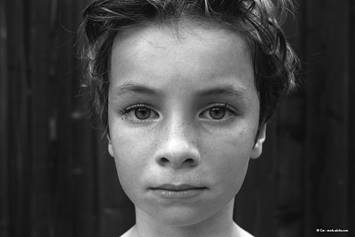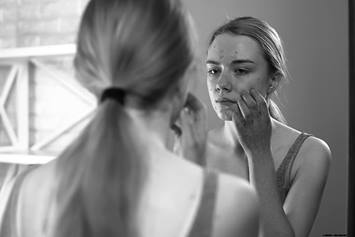Acne
Almost everyone will develop acne to some degree. Treatment requires time, patience, and regular use of any medicine you are given.
What Is Acne?
Acne, also called pimples or zits, is a normal, common skin problem. Some people have more pimples than others.
Acne can be on the face, neck, shoulders, back, or chest. It usually gets better and may go away after your teen years.
What Causes Acne?
Acne happens when tiny openings in the skin (pores) get clogged. Clogs can be caused by:
- The hormone levels in your body changing, like making more hormones during puberty.
- Germs (bacteria), dead skin cells, or oils from your scalp, hair, or skin getting into pores.
- Makeup and some skin care products.
How Acne Forms
- Each pore has a tiny hair in it attached to oil (sebaceous) glands. Those glands make oil called sebum. Too much sebum can clog pores. This can happen when your body makes more hormones during puberty.
- Clogged pores will become blackheads (Picture 1) if the pore is open or whiteheads (Picture 2) if the pore is closed.
- Bacteria can grow in a clogged pore. This causes inflammation, swelling, red bumps, and pus-filled bumps (pustules) (Picture 3). When this happens deep under the skin, an acne cyst may form.

How Is Acne Treated?
There are many treatments for acne. Your doctor or health care provider may suggest:
- Gentle soap, like Dove®, Cetaphil®, or Eucerin®. Wash your face 2 times each day.
- Prescription or over-the-counter (OTC) face wash with benzoyl peroxide or salicylic acid.
- These may irritate the skin and cause dryness and redness.
- Benzoyl peroxide may bleach and ruin your clothes, towels, and sheets. Use white towels and sheets when using products that contain it.
- Prescription cream, lotion, or gel. These are often retinoids or antibiotics.
- Before using these, wash, rinse, and dry your face gently with a clean towel.
- Put a thin layer of medicine on your whole face, not just where you see acne. Keep it away from your eyes and corners of your mouth. Rub it in gently. Don’t wash it off.
- Some of these medicines work better during the day. Some work better at night. Your doctor or health care provider will tell you when it’s best to use them.
- Tell your doctor or health care provider if you have problems with severe skin dryness, redness, or irritation. They may:
- Ask you to use the medicine every other day instead of each day.
- Suggest an OTC, oil-free lotion that won’t clog pores to put over the medicine.
- Prescription acne pill(s), like:
- Oral antibiotics
- Hormonal birth control
- Water pills (diuretics), like spironolactone
- Isotretinoin: Your doctor or health care provider will monitor you closely. Do not take this medicine if you’re pregnant, planning to get pregnant, or breast/chest feeding.
General Care
- Never squeeze or pop pimples, pick at your skin, or rub it too much. These may make acne worse and cause scars.
- Avoid greasy products, like petroleum jelly, cocoa butter, baby oil, or baby lotion, on places where you have acne.
- Keep your hair away from your face and forehead. Do not use mousse, gel, or hairspray near your face.
- Do not use harsh scrubs, abrasive pads, or alcohol.
- Some makeup, sunscreens, and creams may clog pores. Use oil-free, water-based products that won’t clog pores. These are called non-comedogenic.
- Wash your face gently no more than 2 to 3 times a day.
- Eat a healthy diet with lots of vegetables and fresh fruit. Acne may get worse if your diet is high in:
- Foods with a lot of sugar: soda, candy, cookies.
- Processed carbohydrates (carbs): white bread, white rice, cake.
- Dairy: ice cream, milk, cheese.
- Try to stay positive. Your skin may get worse over the first weeks of treatment. It may take 2 to 3 months of treatment to see results.
- Keep follow-up appointments with your doctor or health provider. This helps them see if your acne is getting better. If it’s not, they may change your medicine.
When Should I Call a Doctor for Acne?
Call your doctor or health care provider if:
- Your acne isn’t getting better after 3 months of treatment.
- You’re having side effects from your prescribed medicine(s):
- Nausea
- Vomiting
- Runny poop (diarrhea)
- Stomachache
- Headaches
- Sun sensitivity
Helping Hands™ Patient Education Materials
Helping Hands™ are easy-to-read guides about different illnesses, therapies, surgeries, and more. They’re created by the Patient Education team at Nationwide Children’s Hospital and are reviewed and approved by clinical staff, like nurses, doctors, pharmacists, and psychologists. Nationwide Children's Hospital is not responsible for misuse of information in patient education materials, including Helping Hands.
HH-I-48 | ©1985, revised 2025, Nationwide Children’s Hospital


